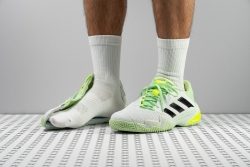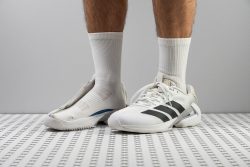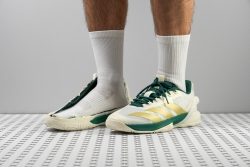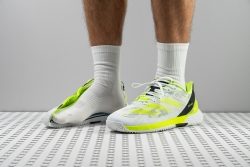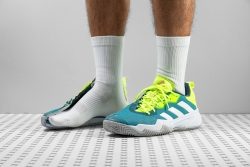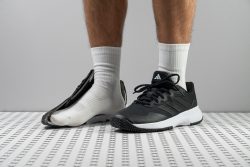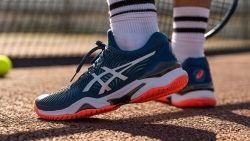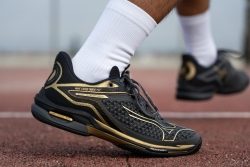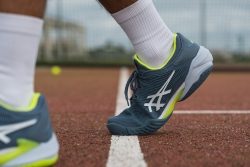7 Best Adidas Tennis Shoes in 2025
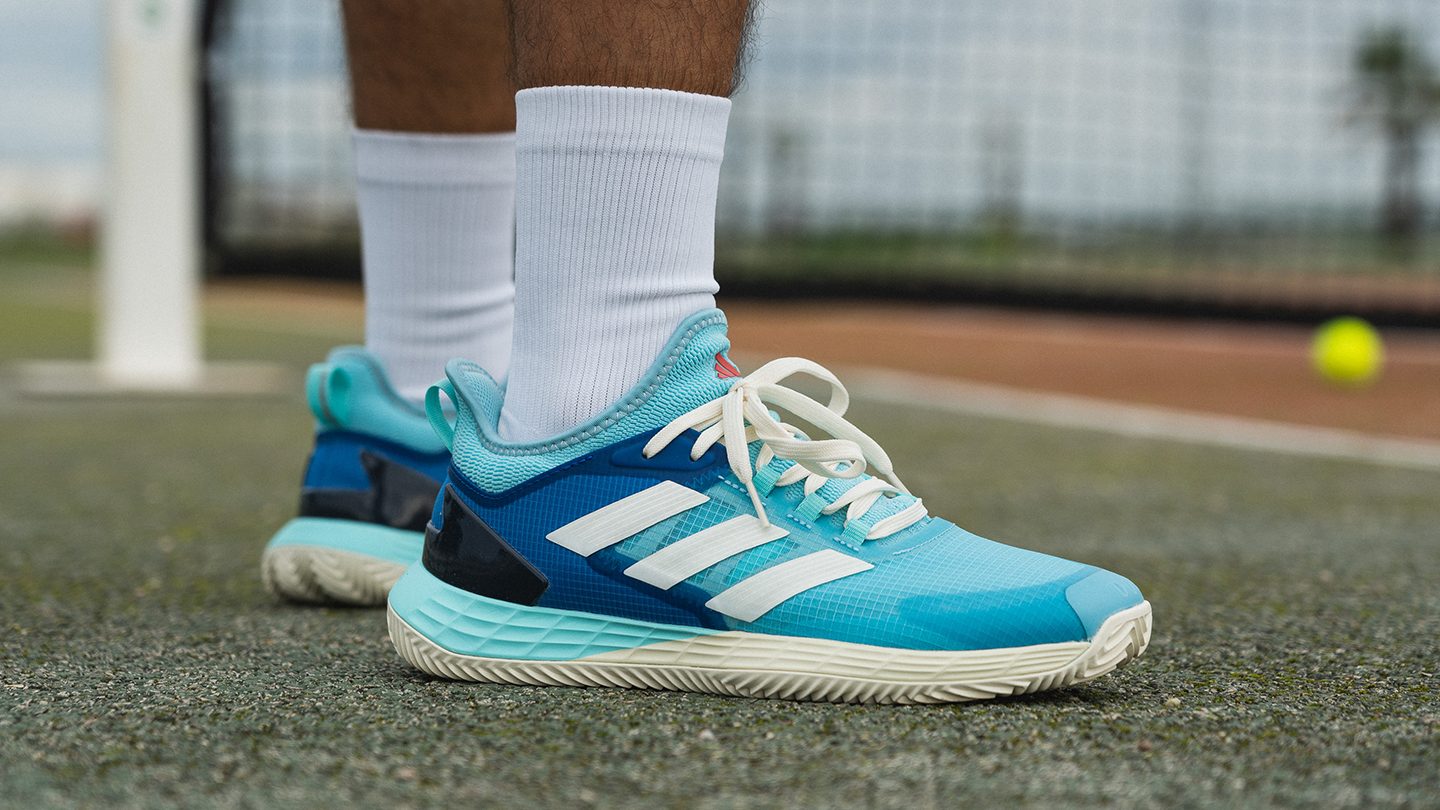
We buy shoes ourselves. We earn commissions when you buy through us, at no extra cost. Why trust us
Even though Adidas's current tennis shoe selection is not that extensive, it can still leave you confused. Which of these pairs matches your needs the best? How do they feel on the court? Are they worth the price?
We spend hours both on the court and in the lab to figure out which Adidas models are worth adding to your tennis shoe racks. Please choose one of our top picks below or scroll down for more nuanced information on the Three Stripes tennis shoes.
How we test Adidas tennis shoes
None of Adidas's tennis shoe releases goes under our radar. Once the shoe is ordered and paid for (no sponsorships), we get down to business:
- We test each shoe on the court, paying special attention to its overall comfort, stability, cushioning, traction, fit, and other characteristics.
- We then take the shoes back to our lab and use specialised tools and machinery to measure and assess over 30 different parameters that are essential for tennis performance. We go as far as drilling each shoe with sandpaper and slashing it in half to take a detailed look at its inner workings.
- All of the information and data we gather during the testing process allows us to provide the most comprehensive reviews of each Adidas shoe and decide on the top picks.
Best Adidas tennis shoes overall
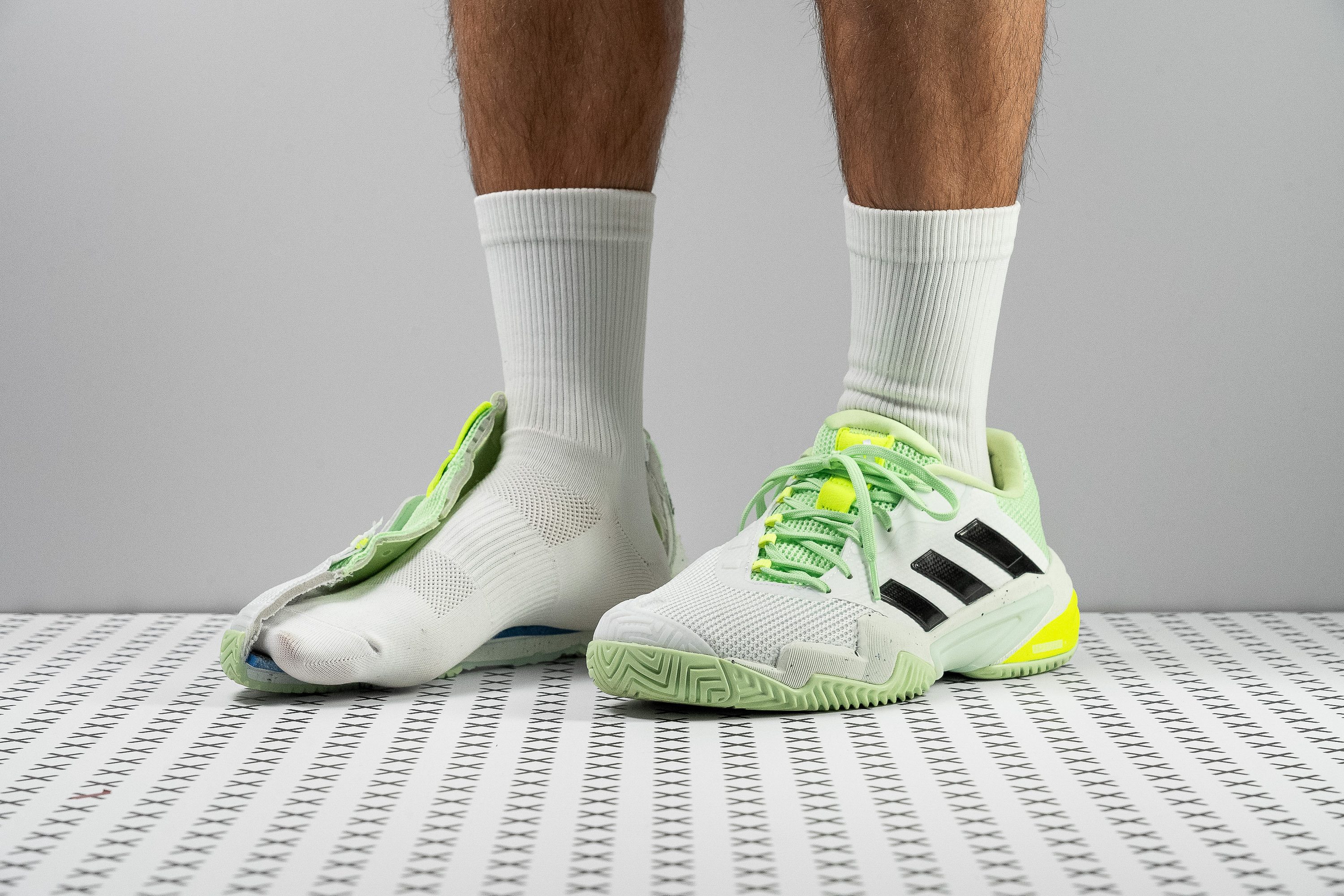

















































What makes it the best?
Barricade 13 dominated the court and excelled in the lab, ultimately being our top Adidas tennis shoe, This high-performance kick redefines the game with its supportive ride, excellent traction, and ability to keep us in control.
Stability is where Barricade 13 shines and it has many elements that work together to promote our precise and steady footwork. It’s home to the Repetitor+ foam, which our durometer measured at a balanced 26.1 HA. However, it feels firmer underfoot, enhancing our ground sensitivity. It’s incorporated within the Torsion System that extends to the medial sides to cradle and support our arches. Feeling like actual barricades on both sides of our feet, we never experienced excessive lateral movements or ankle rolls.
This Adidas shoe found a way to enhance comfort through its longitudinal flexibility. Our bend test reveals it’s 21.3% more malleable than average, allowing us to move through the court with grace and coordination.
As we performed hard stops and quick direction changes in the game, the Adiwear outsole gripped excellently on the court, keeping us safe from any injuries. It mixes flat and sharp herringbone patterns to provide a balance of braking and sliding power as needed. In our wet-condition test, we recorded a very high 0.90 score, proving its strong bite on court.
However, we felt the cushion lacked the responsiveness that some tennis players prefer. Those in search of some extra bounce should look elsewhere.
Pros
- Exceptional stability and arch support
- Wide and steady platform
- Hard-wearing outsole with a 6-month guarantee
- Fantastic outsole grip
- Sufficient impact protection
- Great court feel
- Highly secure foothold and lockdown
- Outsole grips and slides well
Cons
- Upper is not the most durable
- Cushioning lacks bounce and responsiveness
Best Adidas tennis shoes for speed
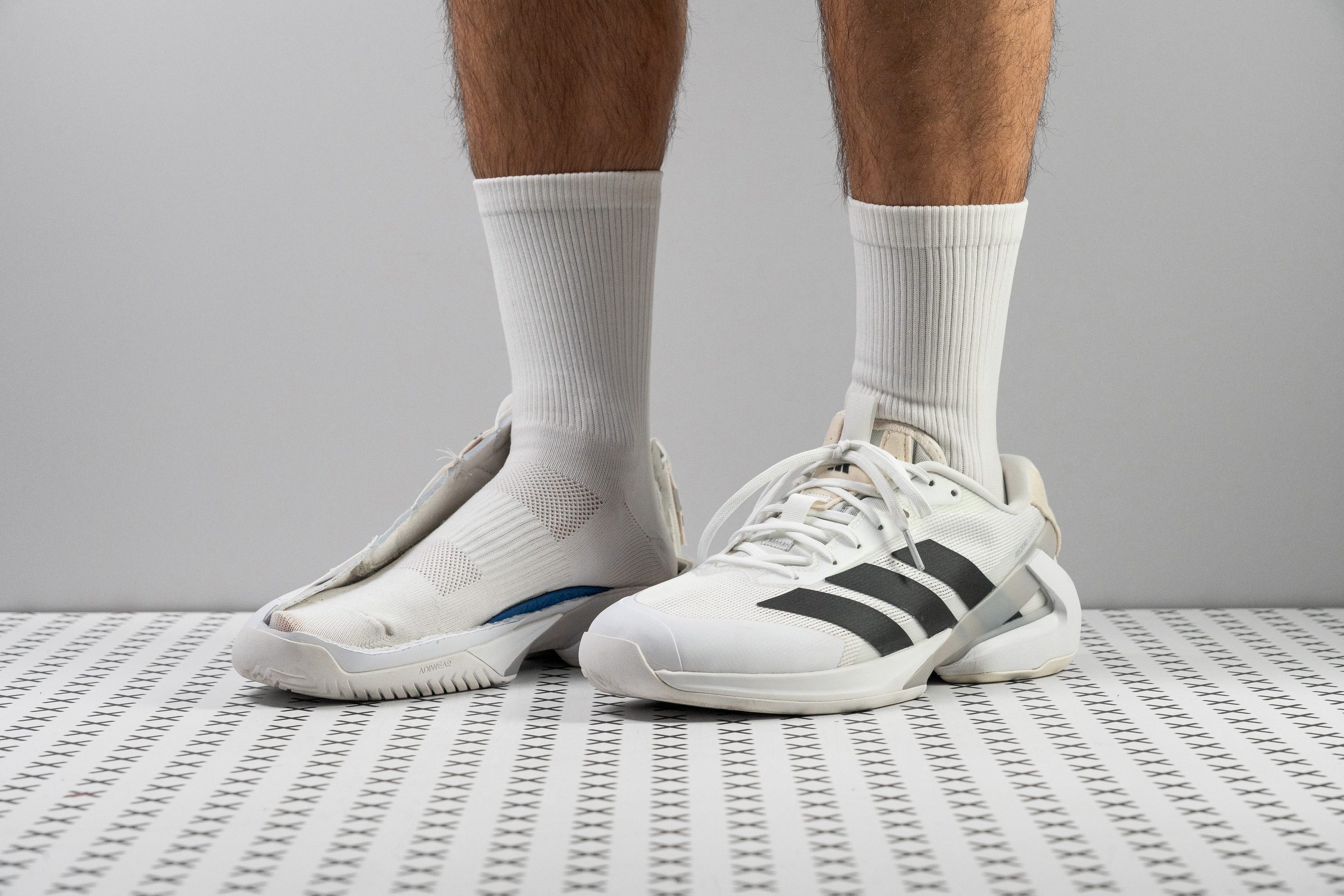














































What makes it the best?
The Adidas Adizero Ubersonic 5 is perfect for moving quickly from one end of the court to the other. It offers direct ground contact, which allows us to move with agility and precision. We felt very sure of our footwork because of the stable platform, while lab tests show the Speedframe is behind the shoe’s energy return. Among Adidas tennis shoes, it’s our top pick for speed.
We felt a strong sense of court-connection with the minimal 26.7/15.6 mm stack height we measured. Moreover, the foam itself doesn’t shield us from the ground, proven by low shock absorption scores of 82 SA (heel) and 48 SA (forefoot).
Because of its strong court feel, it’s easy to react quickly during our matches. Moreover, we found the stiff Speedframe shank in the midsole, which generates tonnes of rebound and snappiness. Besides energy return, it adds a lot of support in the midfoot area.
We also experienced side-to-side stability, courtesy of the stiff exoskeleton that kept us perfectly centred within the shoe. Our manual assessment shows its solid resistance, resulting in the maximum 5/5 torsional rigidity score.
Unfortunately, the shoe’s super speed comes at the cost of comfort and cushioning. Players with foot pain and other conditions, or who just want more impact protection, should go for another option.
Pros
- Super direct court feel
- Grounded and stable platform
- Speedframe adds speed and reposniveness
- Secure heel and midfoot lockdown
- Balanced outsole traction
- Flexible forefoot adds agility
- Perforated sole improves breathability
- Excellent upper and outsole durability
Cons
- Non-existent shock absorption
- Minimal in-shoe comfort
Adidas tennis shoes with the best court feel
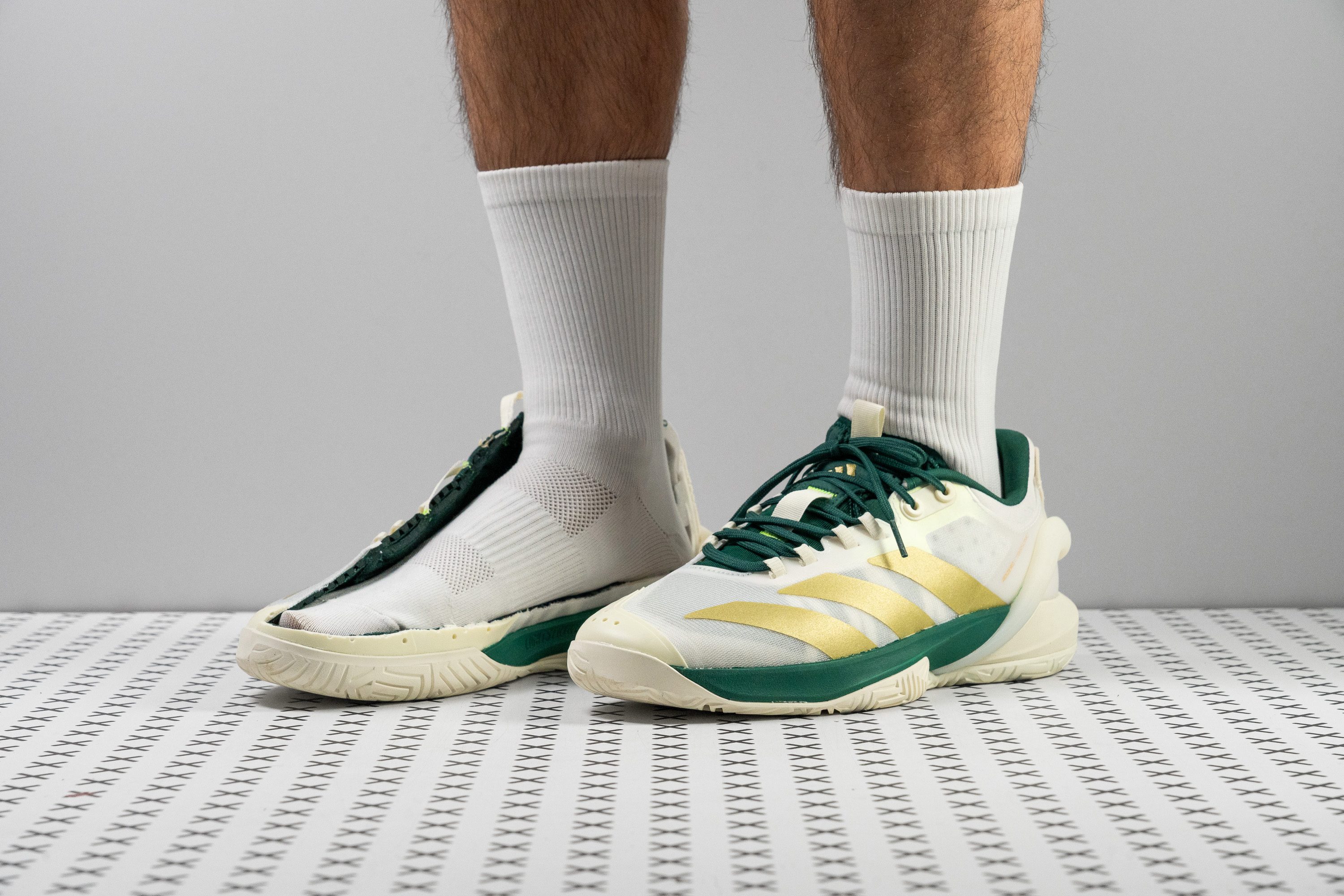














































What makes it the best?
The Adidas Adizero Cybersonic 2 features a low profile that gives us heightened surface sensitivity. Therefore, it’s our Adidas tennis shoe with the best court feel. With this close connection and the presence of the ENERGYRODS in the midsole, lab tests verify the snappy response of this shoe. Plus, it proved to be exceptionally wear-resistant all around.
We measured a moderate stack of 30.0/18.6 mm, but what enhances ground feel is the cushion’s low-impact protection. With low shock absorption scores of 85 SA in the heel and 68 SA in the forefoot, this shoe minimises reaction time, allowing us to move quickly.
Additionally, the ENERGYRODS in the midsole create significant propulsion. They are hollow inside, compressing under pressure and rebounding back to shape quickly, proving the shoe’s great energy transfer. Pushing off to sprint or jump explosively was a breeze!
From the Adituff toe guard to the toebox, our Dremel had minimal effect, so we rated them both a solid 4/5 in durability. Even underfoot, the Adiwear outsole only sustained a small 0.6 mm dent, making it sturdier than average.
However, the outsole’s longevity compromises maximum traction. While it has a lot of room for sliding, we couldn’t perform hard stops wholeheartedly. If a strong bite on court is needed, we recommend skipping this pair.
Pros
- Excellent court feel
- ENERGYRODS make the ride snappy
- Fantastic side-to-side support
- Firm and stable base
- Balanced multi-directional grip
- Highly durable materials
- True to size and fit
Cons
- Minimal shock absorption
- Lacks breathability
Best mid-range Adidas tennis shoes
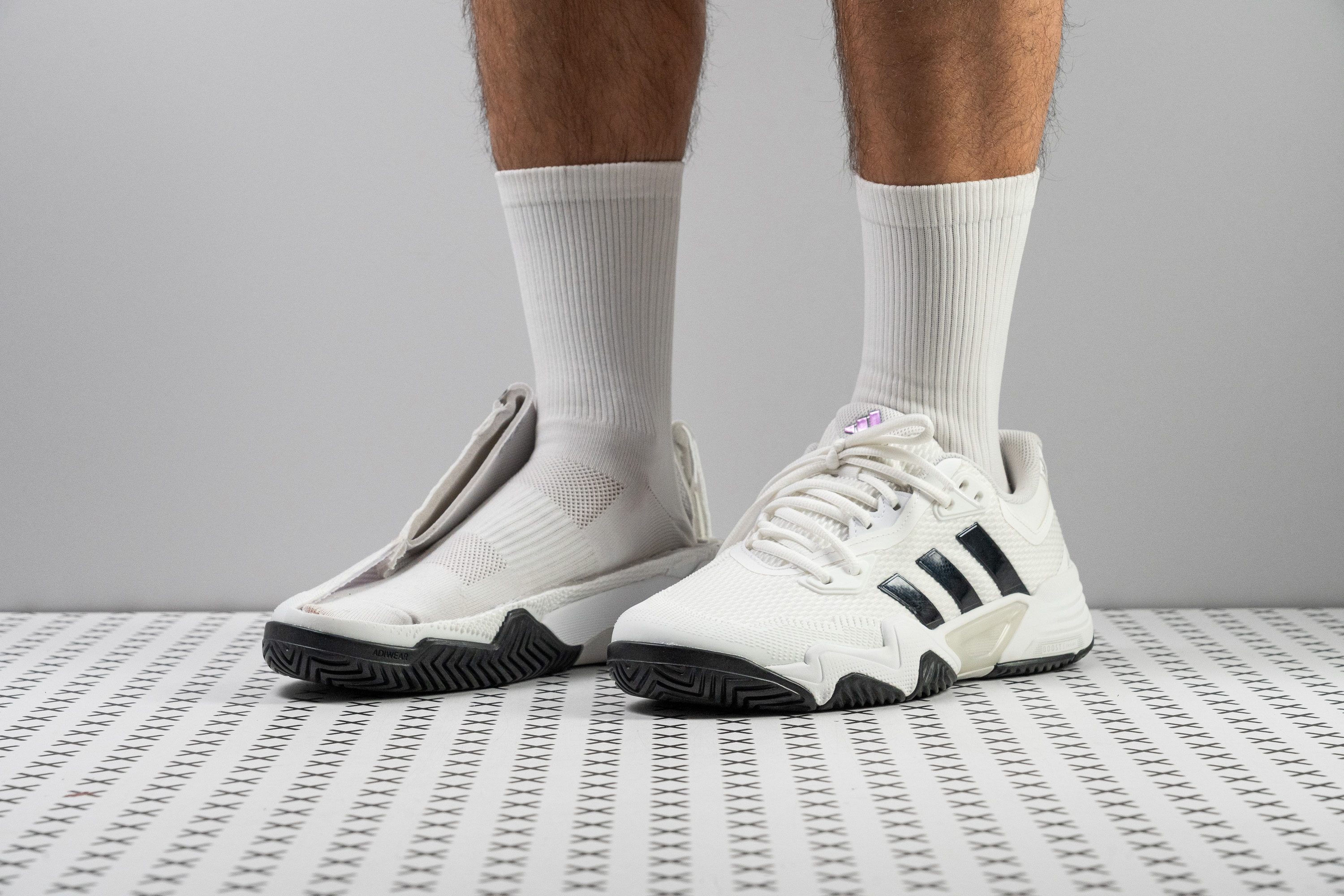











































What makes it the best?
In the lab, we saw how the Adidas Solematch Control 2.0 offers solid stability and durability, at the expense of other qualities. It’s a well-rounded option that offers a roomy yet secure fit, making it our best mid-range tennis shoe from Adidas.
The Torsion System lies at the heart of this tennis shoe, with the midfoot shank generating twist resistance, backed up by its 5/5 torsional rigidity score. Moreover, we measured the heel at 98.1 mm, one of the broadest we’ve seen, making it highly suitable for baseline players who want to feel well-planted.
Comfort is enhanced by its spacious fit and minimal taper. Our solidified gel mould allowed us to measure the toebox interior precisely at a 73.0 mm width, making it friendly to those with wide feet. To improve lockdown, it has more eyelets and asymmetrical lacing for a more customizable fit.
The padded upper increased the shoe’s comfort, and we had no worries about damaging the upper during sliding because of the Adituff overlay, scoring a solid 4/5 durability score in our Dremel test. The toebox material excelled too, with barely any visible damage, earning the top 5/5 durability score.
Sadly, comfort is limited to cooler seasons. We wanted to take the shoes off when playing on a hot day because there is no ventilation. Those who prioritise strong airflow should go for more breathable pairs.
Pros
- Barricade-like stability
- Excellent durability
- Sufficient shock absorption
- Balanced outsole grip
- Decent forefoot flexibility
- Spacious medium-width fit
- Comfortable step-in feel
Cons
- Heavier than v1 and the average
- Deceased energy return
- Lacks breathability
Adidas tennis shoes with the best comfort
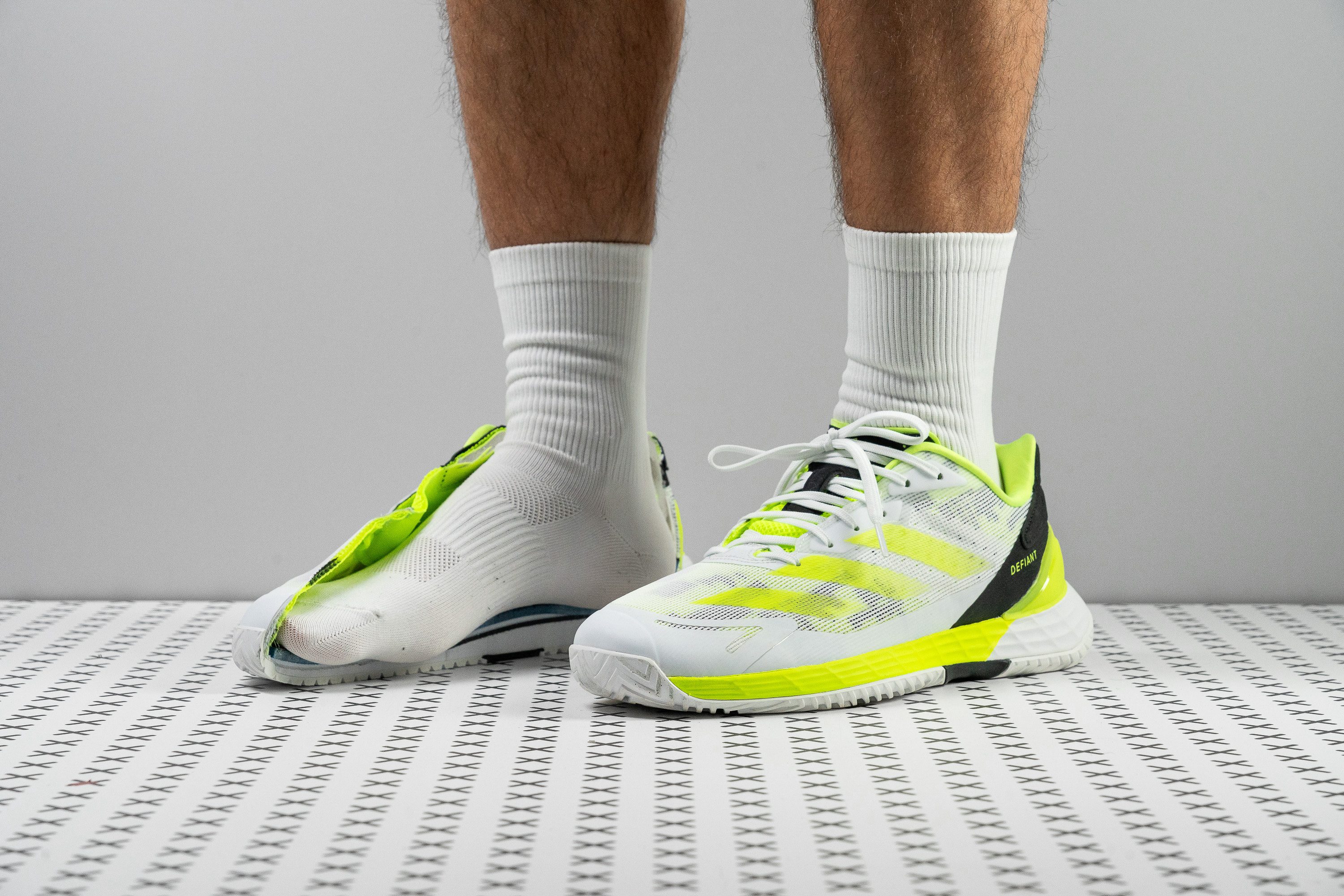












































What makes it the best?
The Defiant Speed 2 highlights agility in our playtests, yet what makes it stand out among Adidas tennis shoes is the top-notch comfort it brings. Our lab tests reveal some components that contribute to its soothing aura: its light and flexible build and the responsive Lightstrike midsole. It even offers all-around longevity as a bonus.
During our games, we observed strong ground feedback without the sting thanks to the energetic Lightstrike midsole. Despite its below-average 28.8/17.0 mm stack, the ride feels forgiving due to the well-balanced 27.1 HA foam.
Defiant Speed 2 has a light and pliable build that boosts comfort and control in our footwork. Our scales reveal it weighs 12.2 oz (347g), 3.6% below average. Meanwhile, it shows minimal resistance by emerging 17.9% more bendable than average in our flex test.
Defiant Speed 2 performs wonderfully in terms of durability and defies our Dremel in all areas. The Adituff toeguard and toebox rated a high 4/5, the heel padding a very resistant 5/5, and the outsole with a small 0.5 mm dent vs. the 0.8 mm average. These numbers erased all our doubts regarding the shoe’s longevity.
However, we think its lockdown could still be improved. The collar design was a bit too spacious for our medium-width feet (even more for those with narrow feet), so we experienced a bit of toe jamming.
Pros
- Grounded platform with good court feel
- Stable base for a speed shoe
- Generously padded insole
- Fairly flexible forefoot
- Impressive durability for the money
- Great balance of grip and give
- Great balance of grip and give
Cons
- Not everyone can achieve a secure lockdown (especially skinny feet)
- Higher drop may cause toe jamming
Best Adidas tennis shoes for clay court
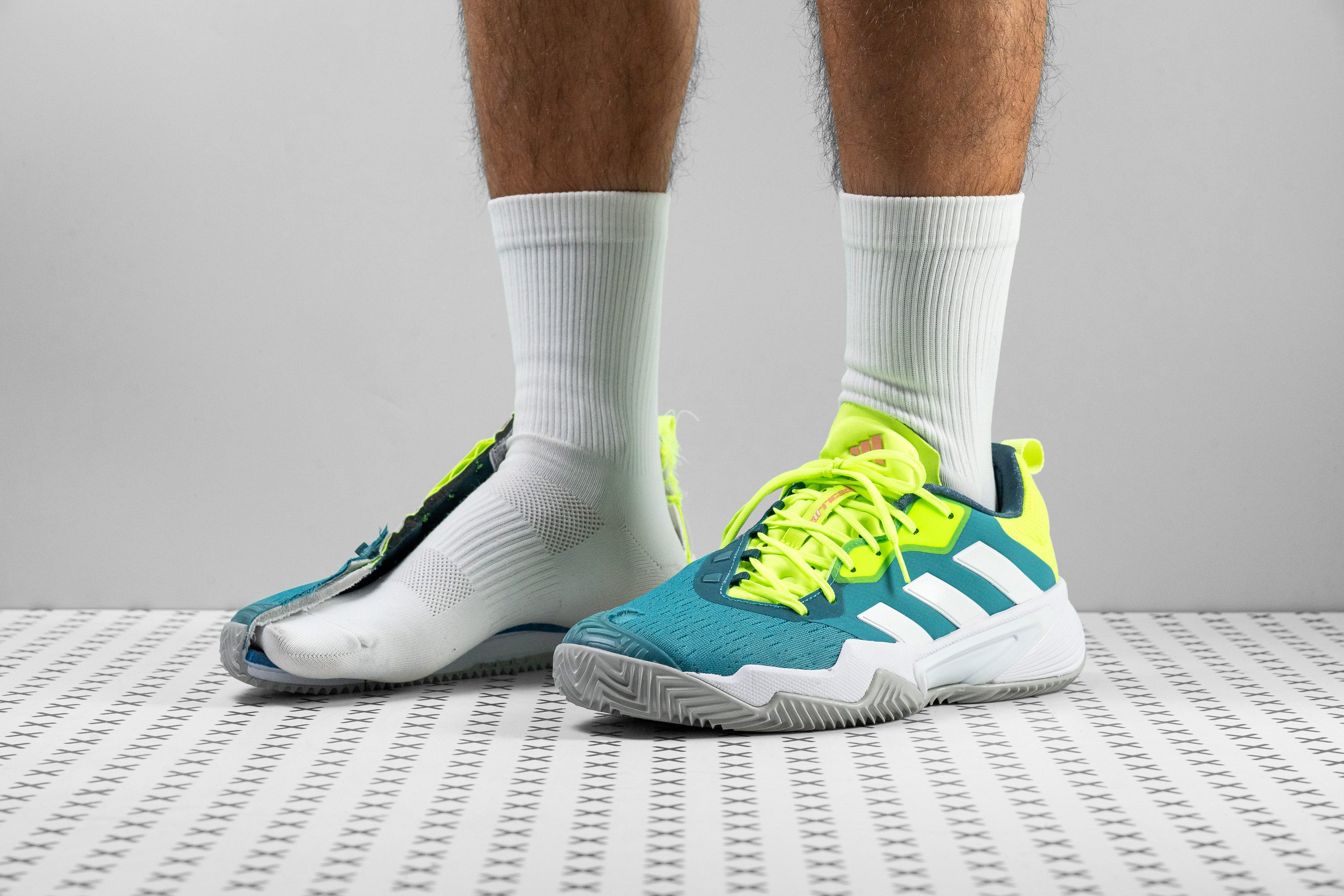





































What makes it the best?
For clay court games of tennis, our absolute top pick from Adidas is none other than the Barricade 13 Clay. This hell of a tennis shoe elevated our playing experience, ensuring balanced and injury-free nimble movements on the court. Not only that but the robustness of this shoe also blew our minds!
We love the Adidas Barricade 13 Clay for sideway propulsions and manoeuvres because it keeps us surefooted no matter how aggressive we are. We measured its width’s base, and it proved the shoe’s stability, as the forefoot sits around the average at 111.9 mm while the heel is 9.6% wider at 98.3 mm.
Apart from stability, Barricade 13 Clay also resisted slipping, thanks to its outstanding traction. Pressing our durometer against the outsole, we recorded a hardness of 79 HC, which is 7.6% softer than average. This equated to the outsole firmly gripping the clay court and keeping us planted through our powerful shots and quick footwork.
We also appreciated how this tennis shoe withstood the harshness of clay courts, and consistent games of tennis, as well as our Dremel tool, which didn’t wear down the Barricade 13 Clay. In fact, the results urged us to give the toebox and heel padding durability scores of 4/5 and 5/5, respectively. However, for its £160 price, 21.6% higher than most tennis shoes, we can’t recommend it for thrift shoppers.
Pros
- Exceptional stability and support
- Incredibly durable upper and outsole
- Generous impact protection
- Fun and responsive cushioning
- Highly secure foothold
- Wide and steady platform
- Good level of flexibility
- Excellent grip but can slide too
- An ounce lighter than the predecessor
Cons
- Lacks breathability
- Heel drop can be too drastic for some
Best budget Adidas tennis shoes
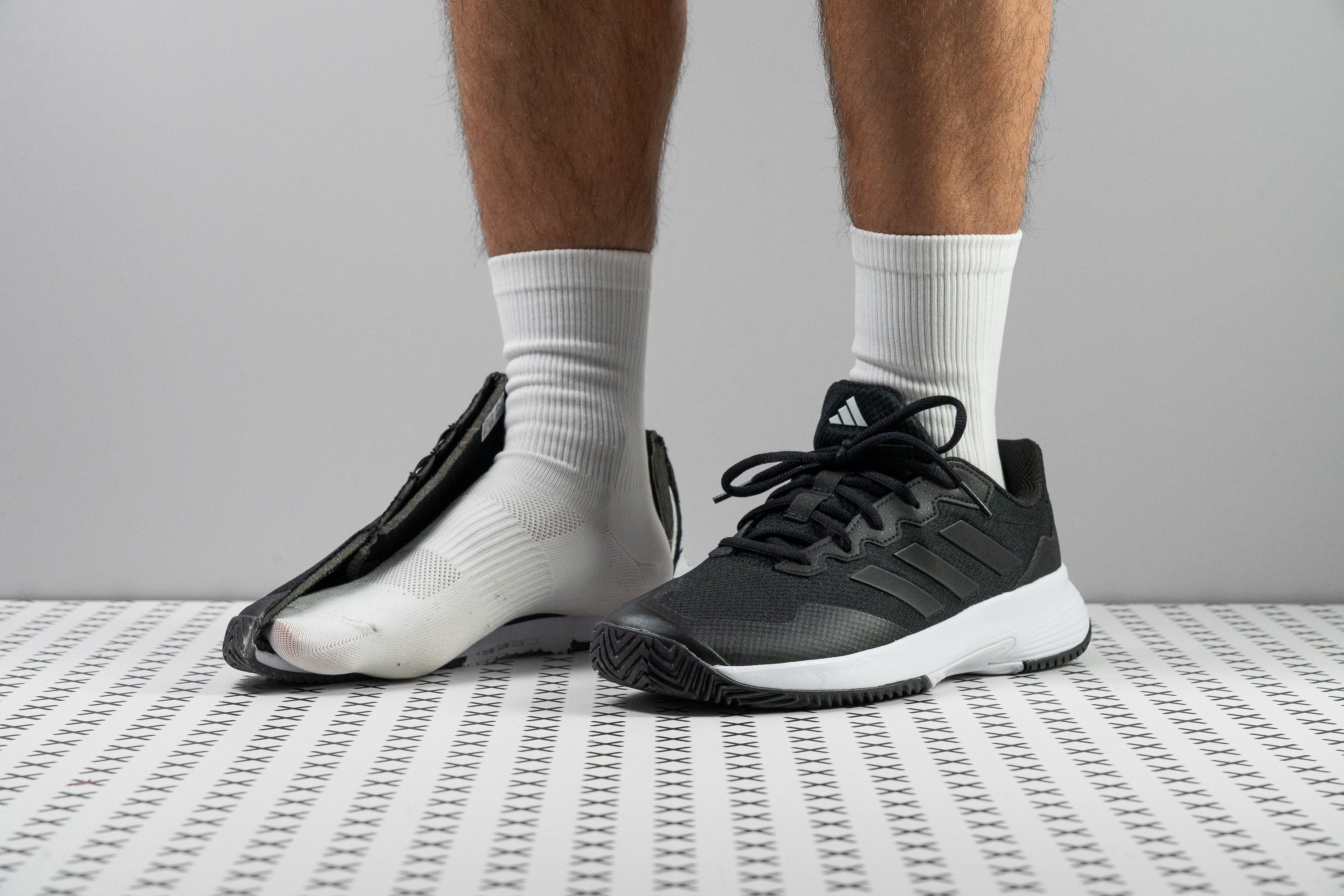










































What makes it the best?
Made for smooth strides and glide-ready comfort, the Adidas Gamecourt 2.0 offers a stable and effortless experience during our playtests. We discovered in the lab that it has a light and fluid build with subtle support elements to keep us surefooted. For only £90 vs. the £140 average tennis shoe, it offers excellent value for money through its durable Adiwear outsole, making it our best budget Adidas tennis shoe.
Gentle on the feet and the wallet, our scales show Gamecourt 2.0 weighs 6.7% lighter than average at 11.9 oz (336g). It flows with our feet and barely resists our motions, confirmed by our bend test when it emerged 29.0% more flexible than average.
Meanwhile, the base is a firm 32.0 HA to boost our stability. Together with its raised sidewalls and midfoot shank, it felt impossible to lose our balance while performing hard dashes or crossover steps.
When we flipped the shoe over, we were floored to find the sturdy Adiwear outsole typically seen in more expensive counterparts. The herringbone pattern does the job in terms of grip, while our Dremel only damaged the rubber by 0.4 mm vs. the 0.8 mm average, cementing its durability.
However, cushioned comfort is its weak point, so we suggest those seeking a plush and impact-protected sensation to look elsewhere.
Pros
- Fantastic durability for the price
- Very supportive for its built
- Wide and stable platform
- Lighter than average
- Highly respponsive midsole
- Excellent grip on hard court
- Flexible and manoeuvrable
- Accommodating toebox
- Nicely breathable
Cons
- Very little forefoot cushioning
- Minimal impact protection
Choosing the right Adidas tennis shoes for you
To enjoy your on-court experience to the fullest, it is essential to choose Adidas shoes that match your court type, playing style, budget, and other preferences.
Let’s take a look at the most general types of Adidas tennis shoes.
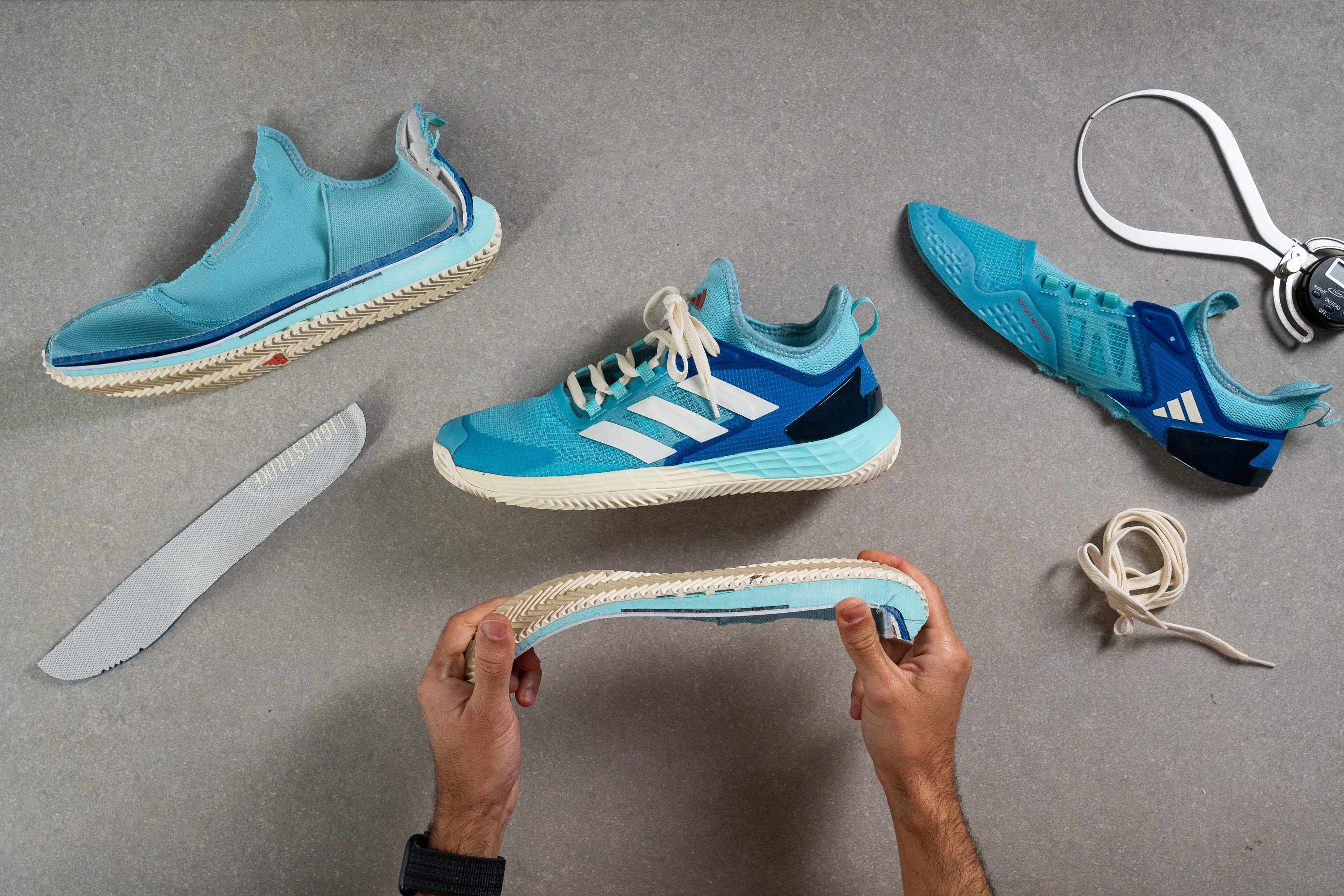
By court type
Most tennis shoes from Adidas are available in an ‘all-court’ variant, especially if you are shopping in the USA. This means that you can confidently rock them on any acrylic-painted concrete or asphalt hard court surface.
But you can also find most of Adidas’s offerings in their ‘clay’ versions. These are more common in the EU, just like the clay court surface itself. The only difference between these two Adidas shoe types is the outsole – the clay court versions feature an aggressive herringbone pattern with really deep zigzaggy grooves that allow you to slide on loose clay and shed the latter from the outsole.
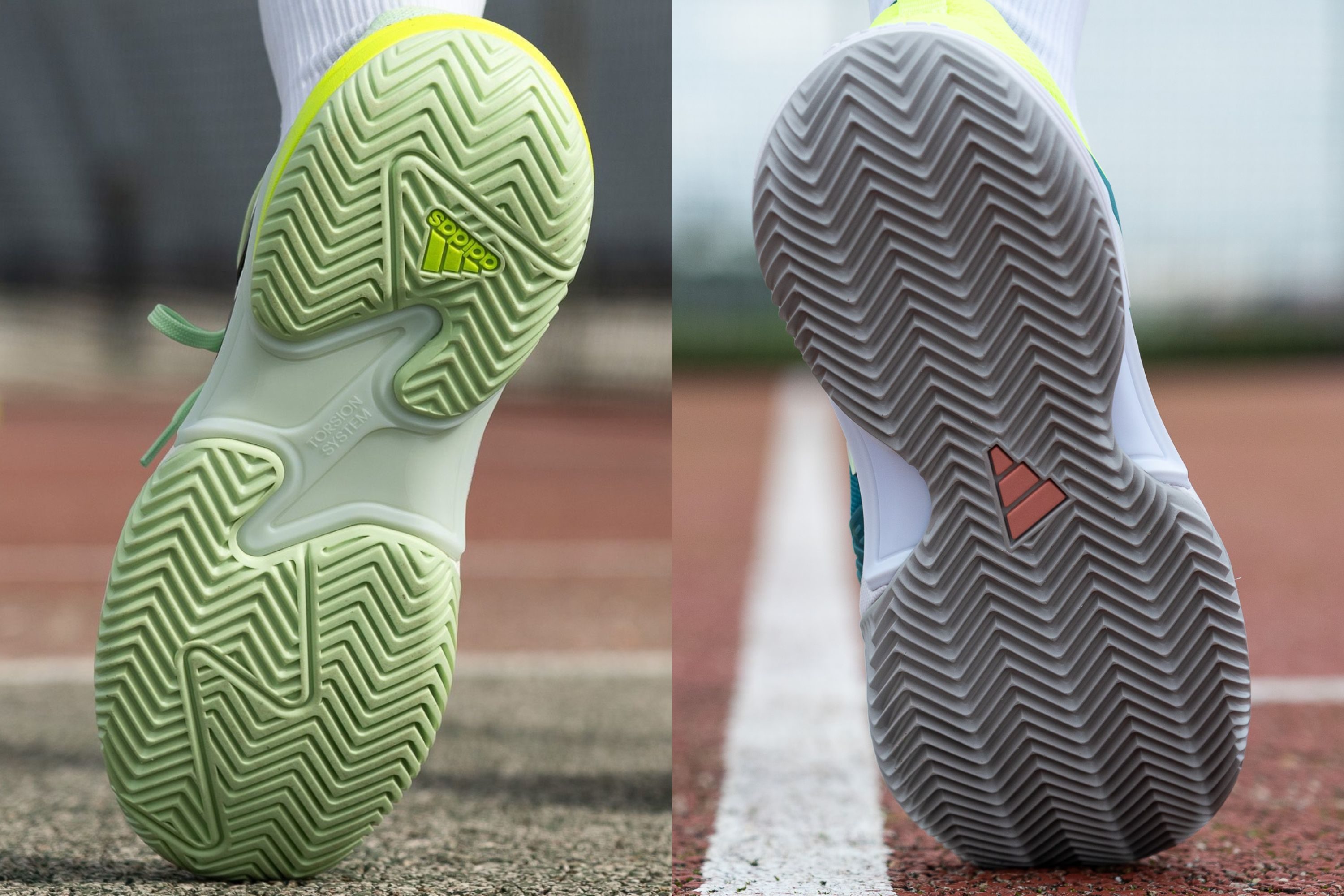
By playing style
Depending on the playing style they accommodate, all Adidas tennis shoes can be roughly divided into two categories: stability and speed.
Stability shoes are sturdier, heavier, and offer tonnes of support (Adidas Barricade is a classic example here). They can be recommended to players who need a lot of arch/ankle support, baseliners, and folks with prior injuries.
Speed shoes are lighter, nimbler, and lower to the ground (think Adidas Cybersonic). These are perfect for fast all-court players who move to the net and back throughout the match.
By budget
For generations, Adidas has been serving up tennis shoes that appeal to players of all levels, from beginners to ATP professionals.
So no matter what your tennis proficiency is, Adidas has an option for you.
Expensive/advanced shoes from Adidas are normally priced between £150 and £180, while special editions and collaborations (i.e., Y-3) can reach £200 or even £220. These premium offerings are packed with the brand’s cutting-edge features that enhance cushioning, stability, and durability.
Affordable/beginner-friendly offerings start from £70. They pack more basic materials and have simpler designs, catering to occasional and recreational players who want to enjoy tennis without investing too much.
But the good news is that you can cop the more expensive Adidas models at a pretty generous discount as well! Here at RunRepeat, we keep track of all sales in over 200 online shops to let you know where you can buy each Adidas shoe (in your size and colorway) at the cheapest price.
Cushioning in Adidas tennis shoes
Long hours of pounding on the court can take its toll on your feet and joints. So, making sure that your future pair of Adidas tennis shoes has enough underfoot cushioning is essential.
In our lab, we perform a series of science-backed tests and measurements to assess the following cushioning properties:
- Shock absorption
- Energy return
- Stack height
- Heel-to-toe drop
- Midsole softness
Shock absorption: This parameter indicates how much of the impact is absorbed by the shoe’s midsole to protect the player’s feet and joints. The higher the SA score, the better the protection.
We recommend choosing Adidas shoes with a higher SA if you play longer matches, have foot pain, prior injuries, or are a heavier person.
Energy return: This measurement reflects how much of your energy is returned back by the shoe’s midsole. The higher the percentage (%), the springier the ride.
Adidas shoes with a higher energy return make the ride feel more bouncy and responsive, whereas shoes with a lower reading feel more grounded.
Stack height: We cut all shoes in half and use a digital calliper to measure how much material there is between the foot and the ground (insole, midsole, and outsole included). The lower the stack, the better the court feet and vice versa.
Tennis shoes in general, and Adidas shoes in particular, rarely exceed 30 mm in the heel in order to keep the foot stable enough for dynamic multi-directional movements.
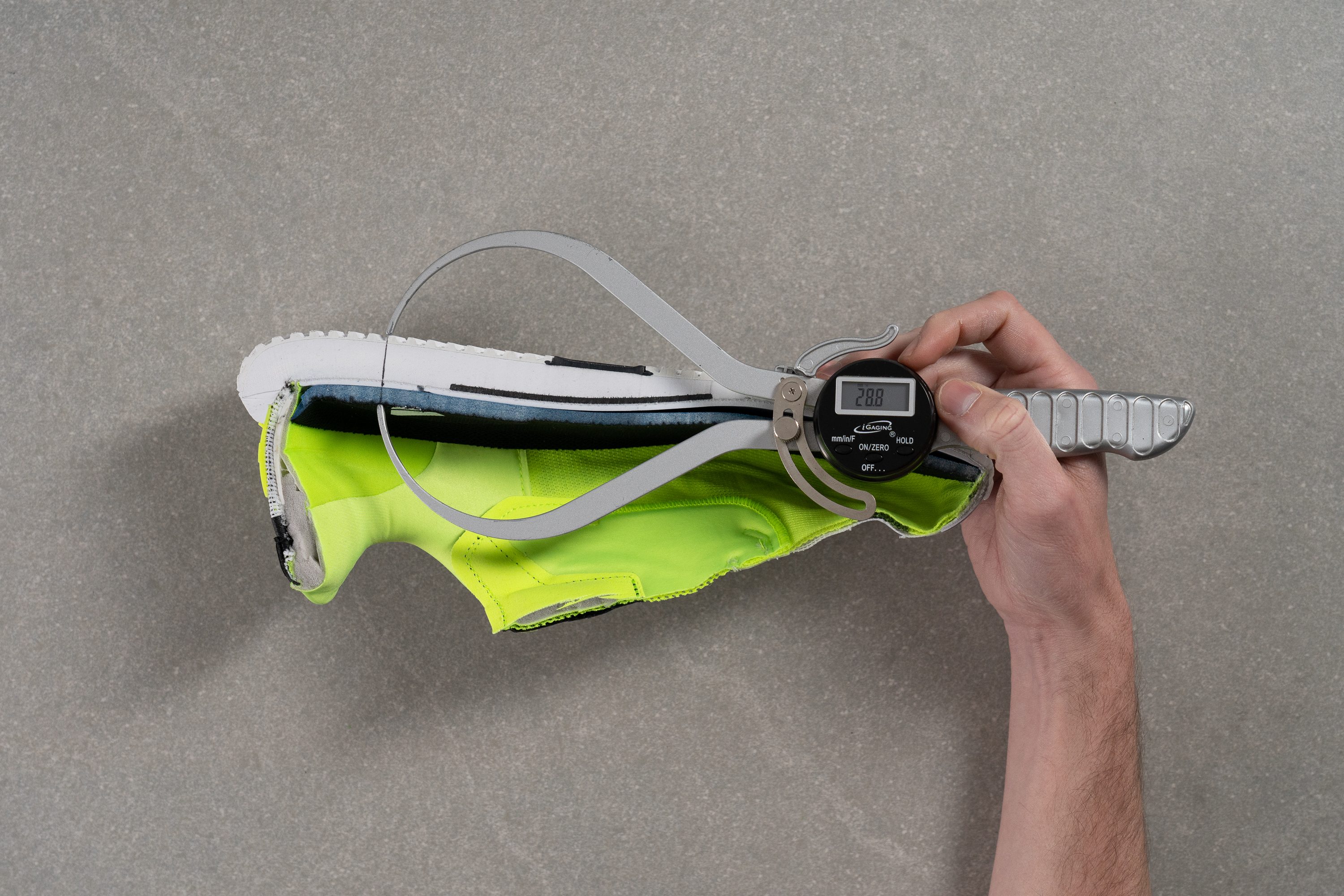
Drop: The difference in stack heights results in a heel-to-toe drop, or the angle your foot takes inside the shoe.
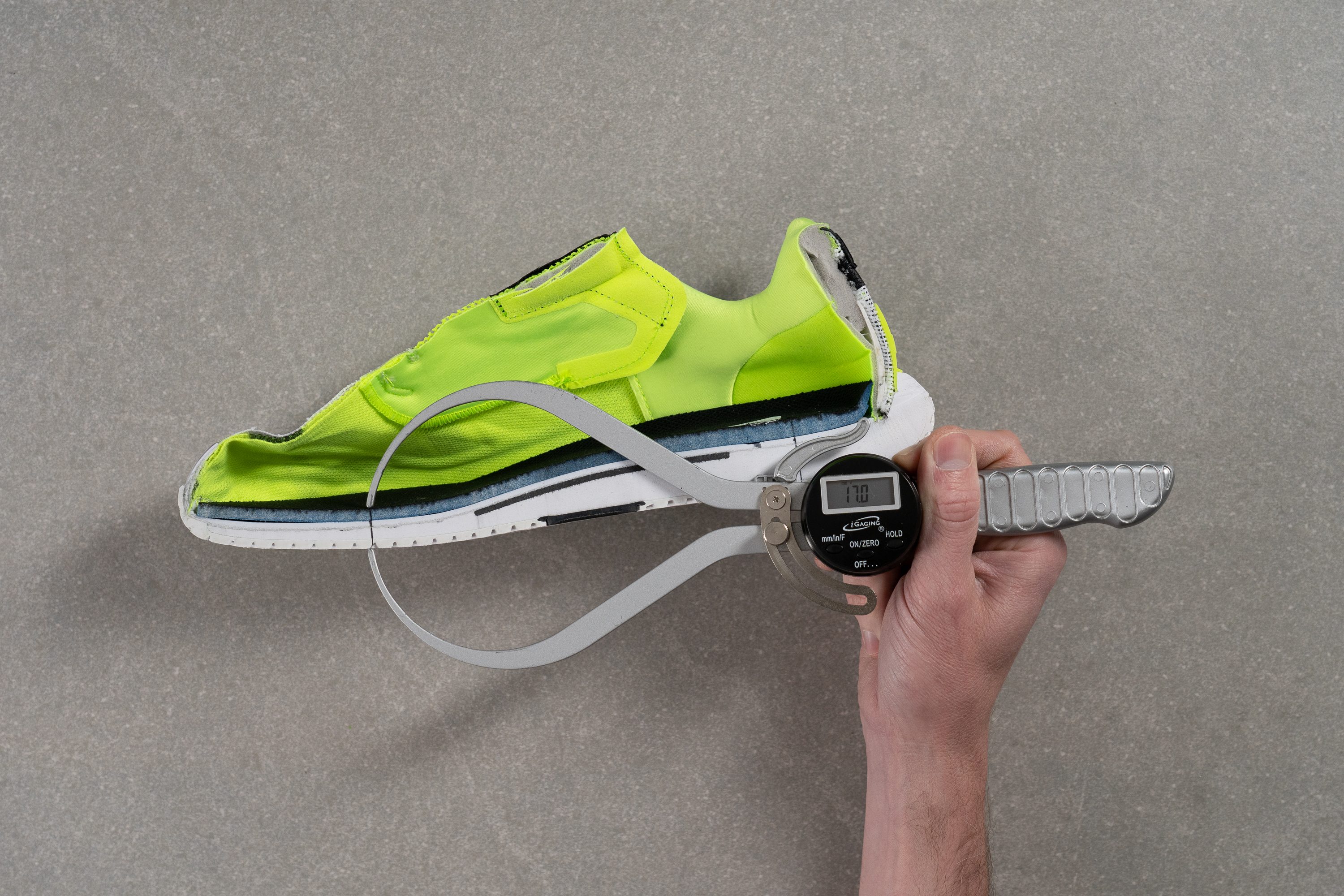
In most tennis shoes from Adidas, it hovers around 10-11 mm, placing the heel higher above the toes to increase cushioning in the heel, take the pressure off the Achilles, improve proprioception in the forefoot, and put the foot in a slightly forward-leaning position for faster reaction.
Midsole softness: We press a Shore A durometer against the shoe’s sliced midsole to measure the softness of its foam from the inside. The lower the HA reading, the softer the compound (less than 20 HA is considered plush, 20-30 HA is balanced, and above 30 HA is firm).
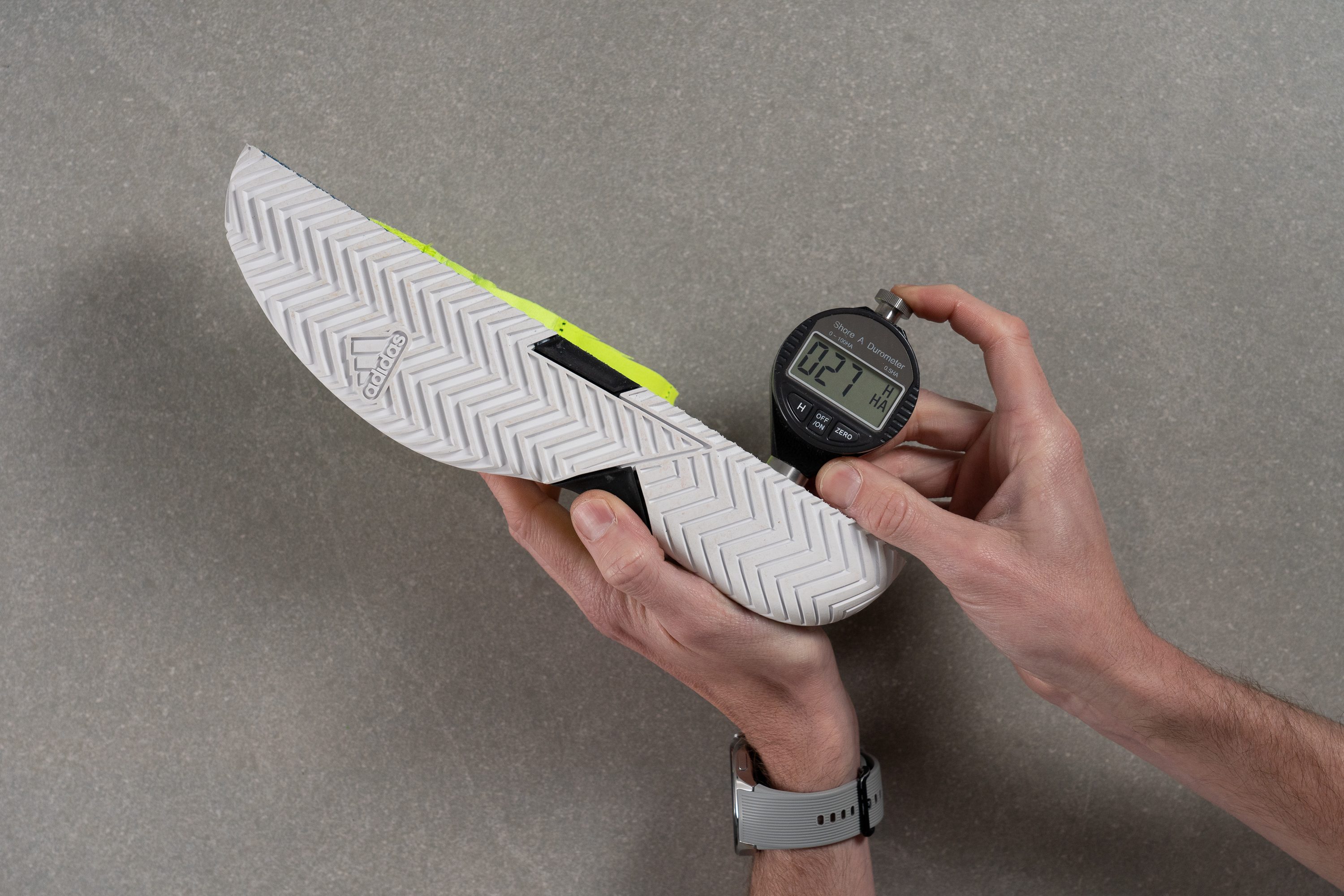
Depending on your personal preference, you may want a softer or a firmer underfoot experience.
Lateral stability and support in Adidas tennis shoes
Tennis involves plenty of forceful and dynamic side-to-side movements that call for strong lateral support in your footwear. In fact, this is one of the main reasons why regular running shoes and casual trainers don’t cut it for tennis.
But not all tennis shoes from Adidas are equally stable and supportive. As we mentioned earlier, some models prioritise agility and speed, leading to some sacrifices in the stability department.
For an objective assessment of each Adidas shoe’s lateral stability, we conduct the following tests and measurements:
- Torsional rigidity
- Heel counter stiffness
- Midsole width
Torsional rigidity: We perform a manual test of each shoe’s torsional rigidity to check how hard it is to twist the shoe sideways. We then give it a stiffness score on a 1-5 scale, where 5 is the stiffest.
The most stable Adidas shoes will show plenty of resistance and will not yield to this action as they are packed with sturdy stabilising components in the midfoot (this can be an internal shank, an external cage, or both). And when the shoe refuses to twist, it won’t let your foot and ankle do the same either.
Heel counter stiffness: Another manual test reveals how stiff a given shoe’s heel counter is on a 1-5 scale.
A stout heel counter helps to keep the heel in place and prevents the foot from rolling over the edge of the shoe. This is especially important for players with flat feet and overpronation.
But on the other hand, an overly stiff heel counter can irritate players with Achilles-related concerns like Achilles tendonitis. So the key here is to match an Adidas shoe to your personal needs and preferences.
Midsole width: We use a digital calliper to measure the widest areas of each shoe’s midsole in both the forefoot and the heel.
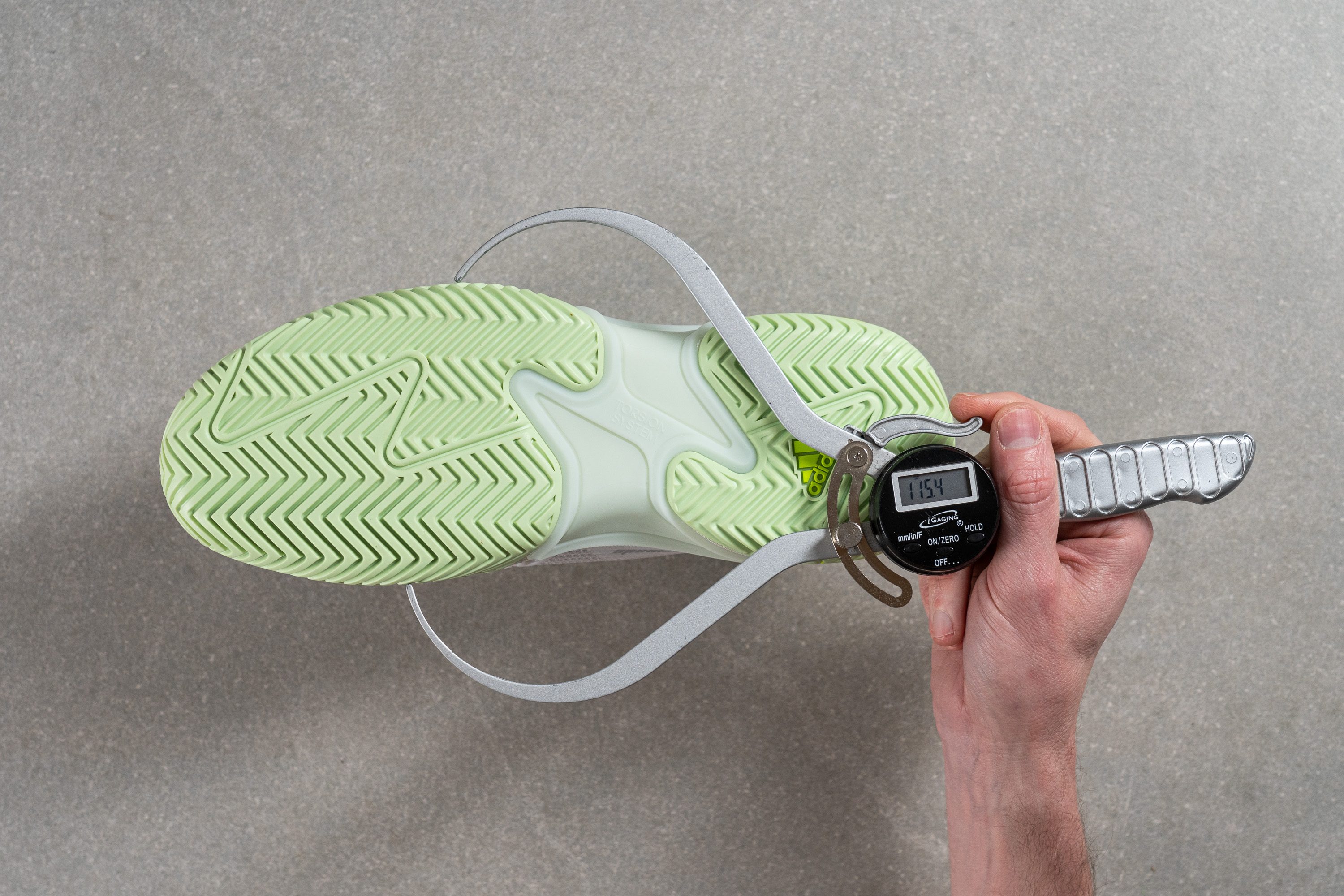
A wider base ensures stability by offering a generous landing area for the foot to plant and push off.
Adidas tennis shoes with the best traction
Due to the varying rubber blends and traction patterns used in them, Adidas tennis shoes differ in the amount of friction their outsoles generate on the court.
Because the perception of grip can be highly subjective, we follow an industry-acclaimed SATRA TM144 method for measuring the precise friction each shoe generates.
Our machine records a coefficient of friction in the forefoot because that’s where tennis players rely on grip the most during the game. The higher the reading, the stronger the traction.
Are Adidas tennis shoes durable?
Carrying a popular brand logo doesn’t always guarantee excellent quality. The designs, material choices, and price points of each Adidas shoe can all impact its long-term durability.
But because we can’t put hundreds of hours into court testing every single tennis shoe, we rely on a Dremel and sandpaper to test the abrasion resistance of the following shoe parts:
- Toe drag guard
- Toebox
- Heel padding
- Outsole
Toe drag guard: One of the most high-wear areas in a tennis shoe, the inner side of the forefoot takes on a lot of wear and tear from sliding on the court.
That’s why we apply the same Dremel speed (10K RPM) to each Adidas shoe’s toe drag guard as we do to the outsole. And if there is no added protection in this area, it gets destroyed in an instant.
Toebox: We also apply the Dremel to the top of the shoe’s toebox, which is often made of the same material (extile, mesh, or other) as the rest of the upper.
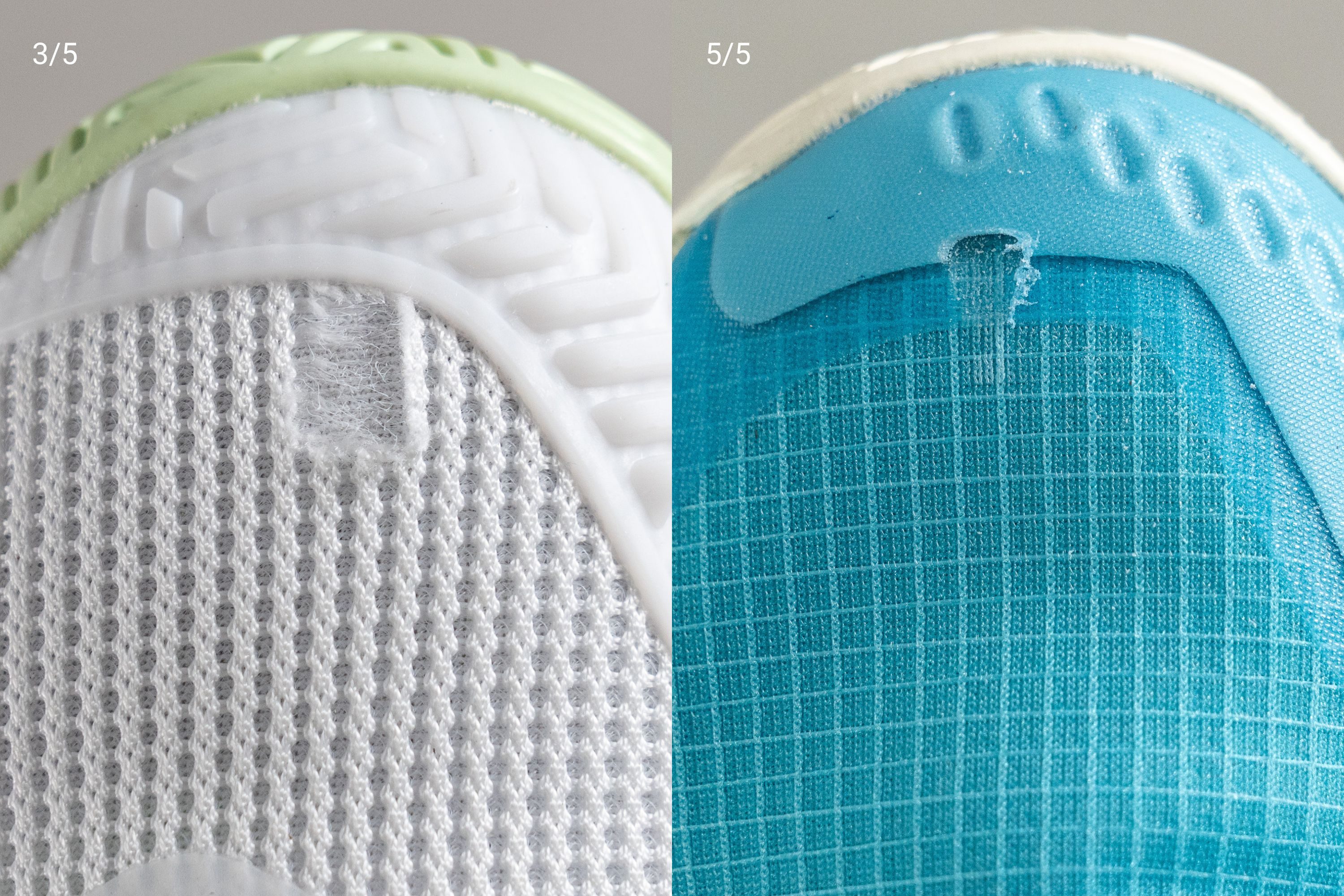
Heel padding: Even though it’s not a shoe part that comes to mind immediately, its wear and tear can be pretty annoying. It can lead to chafing and blistering, and affect on-court performance by distracting you from the game.
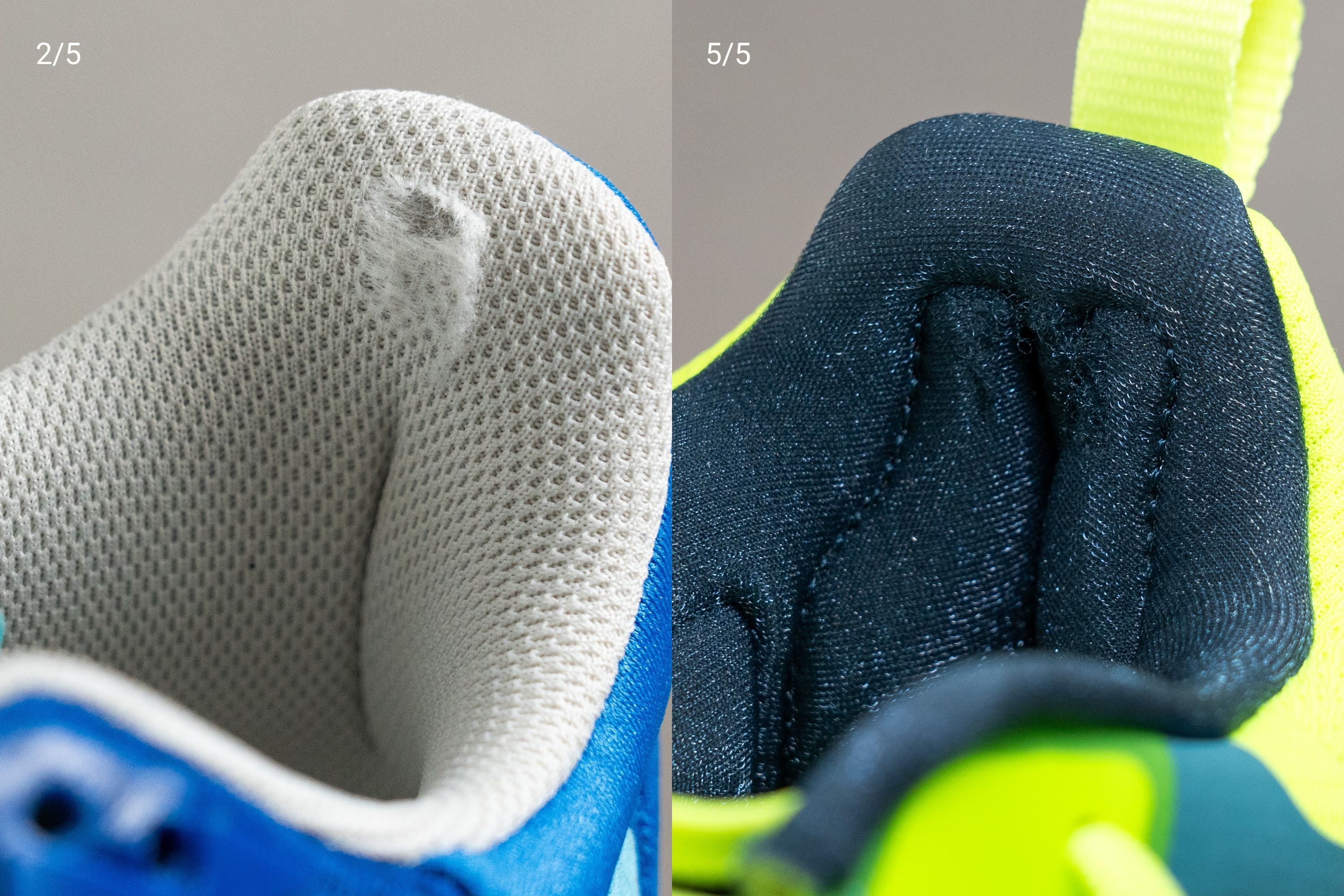
Outsole: Similarly to other tennis shoe brands, this is the only shoe part that is subject to a durability warranty from Adidas. However, it’s not offered for all shoes.
That’s why our durability test is particularly demanding in this area. Not only do we ramp up the Dremel speed to 10K RPM, but we also extend the drilling time to 18 seconds and use a tread gauge to measure the depth of the dent down to 0.1 mm.
NOTE: Please note that clay shoes will have poorer outsole durability results than their hard-court counterparts due to softer rubber and a sharper tread pattern.
Getting the right size and fit in Adidas tennis shoes
Last but not least, your future pair of Adidas tennis shoes must be a perfect match in terms of size and fit. We’re talking both length- and width-wise.
Length: Even if you are 100% sure about your regular shoe size, we highly recommend measuring your current foot length before purchasing a new shoe online. These 3 simple steps and Adidas’s size chart lower the risk of ordering the wrong size, which can save you time and money on returns.
Width: Unfortunately, none of Adidas’s tennis shoes are available in wide options. That’s why you have to be sure that the regular medium width can accommodate your foot. But how on earth would you know that without trying the shoe in person?
We are solving that problem with a custom gel test, which involves filling the shoe’s interiors with liquid and keeping it in the freezer until the substance solidifies in the shape of the shoe’s toebox.
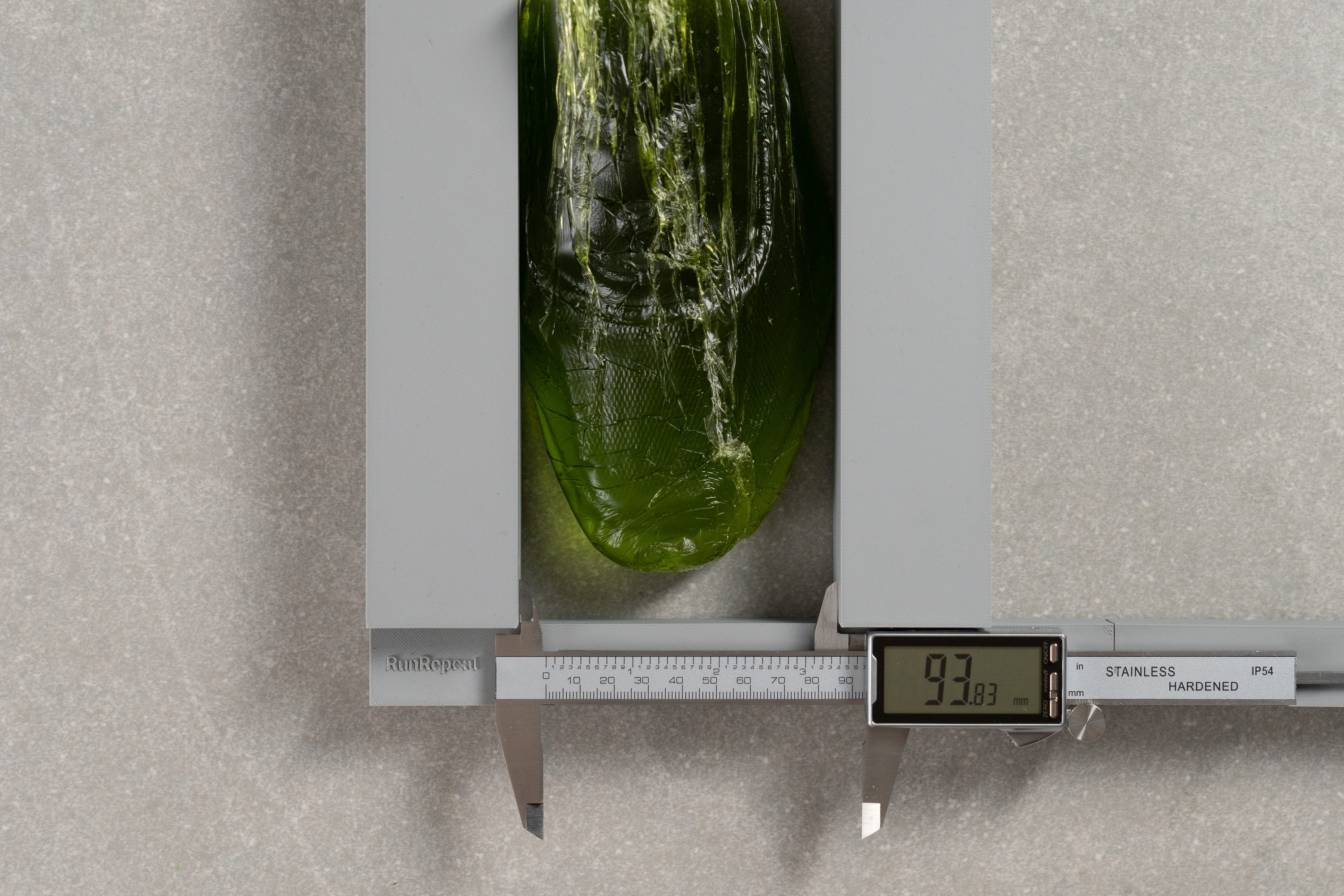
Then, we measure the gel mould with a digital calliper in the following areas:
Widest part (ball of foot area): This measurement gives an idea of how wide and spacious a given Adidas shoe is in general.
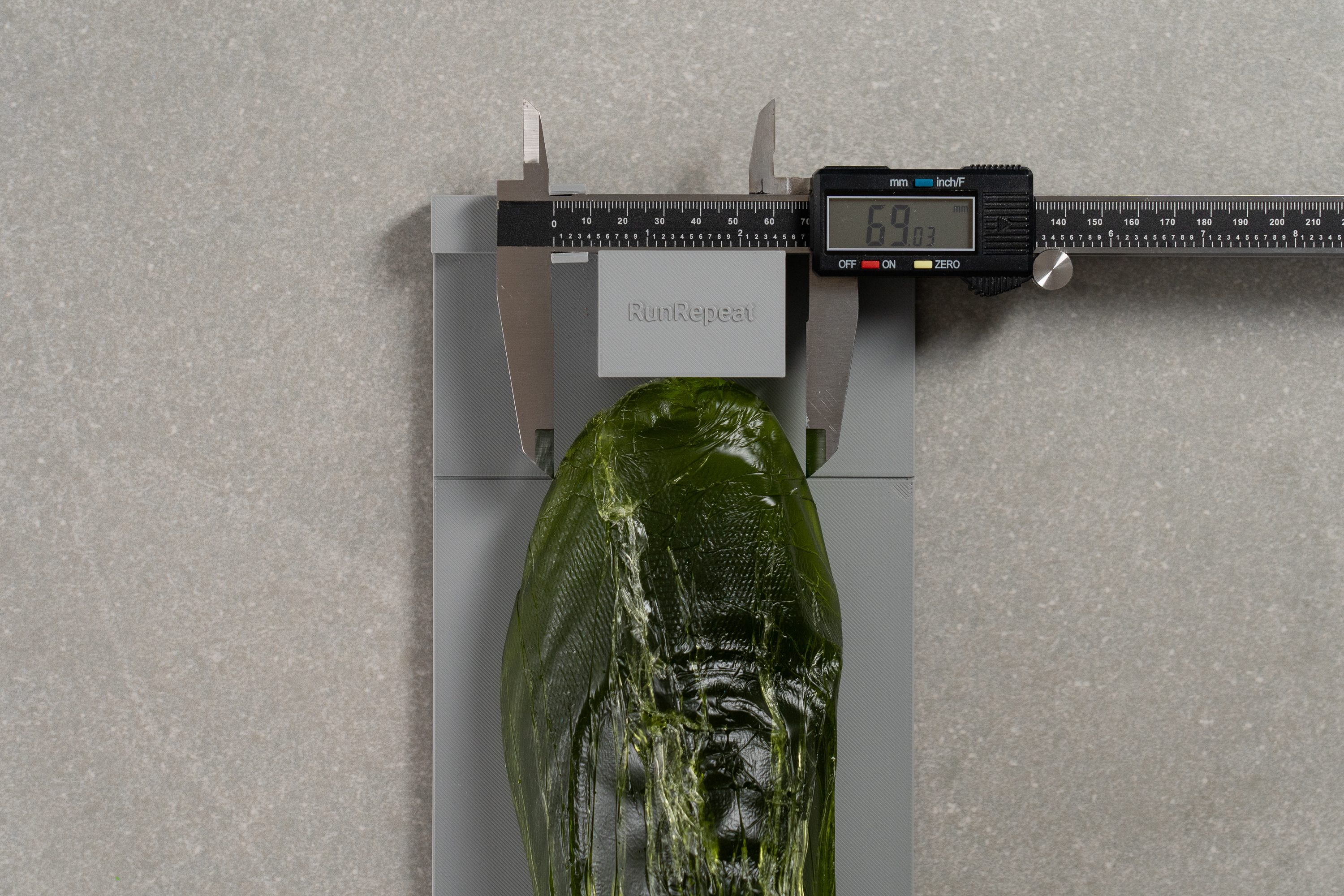
Toebox width (big toe area): Measuring the shoe’s internal width closer to the front, we can see how much tapering there is in the toebox.
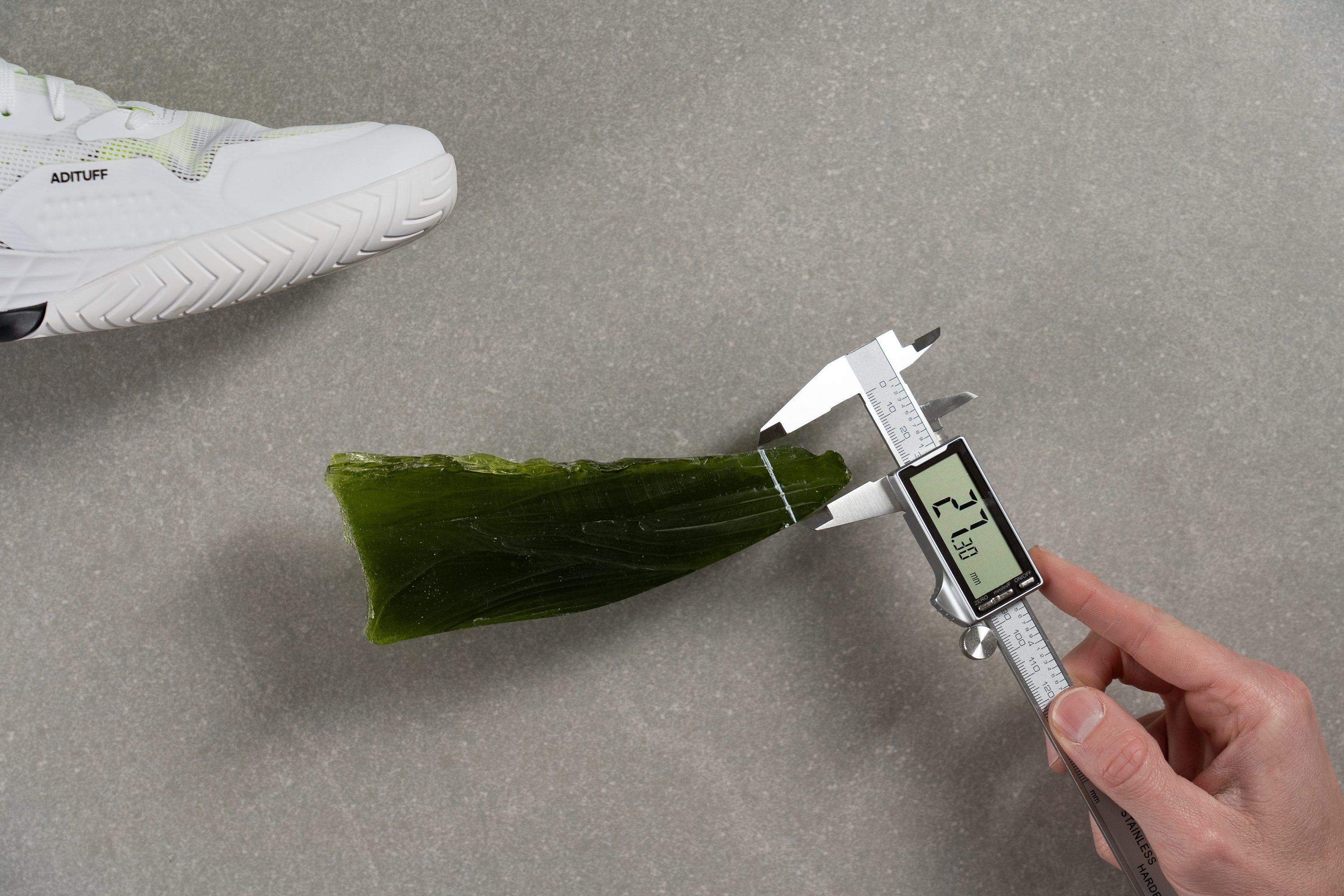
Toebox height: Lastly, the shoe’s toebox height can tell us how much vertical space there is in a given Adidas shoe. This is particularly important for people with toe-related concerns (i.e., black toenails).
How about casual tennis shoes from Adidas?
The term ‘tennis shoes’ can be confusing, as it can imply both performance court shoes and casual trainers. And the fact that some performance tennis shoes have turned into casual trainers makes it even more confusing.
The Adidas Stan Smith is one of such examples. This legendary silhouette is named after Stanley Roger Smith, a prominent American tennis player from the 1960s and 1980s. It is renowned for being the first-ever leather tennis shoe and was even listed in Guinness World Records for the number of pairs sold (22 million in 1988).
It is an eternal, classic, and versatile kick that is easy to style. However, it is no longer a performance tennis shoe by any means.

